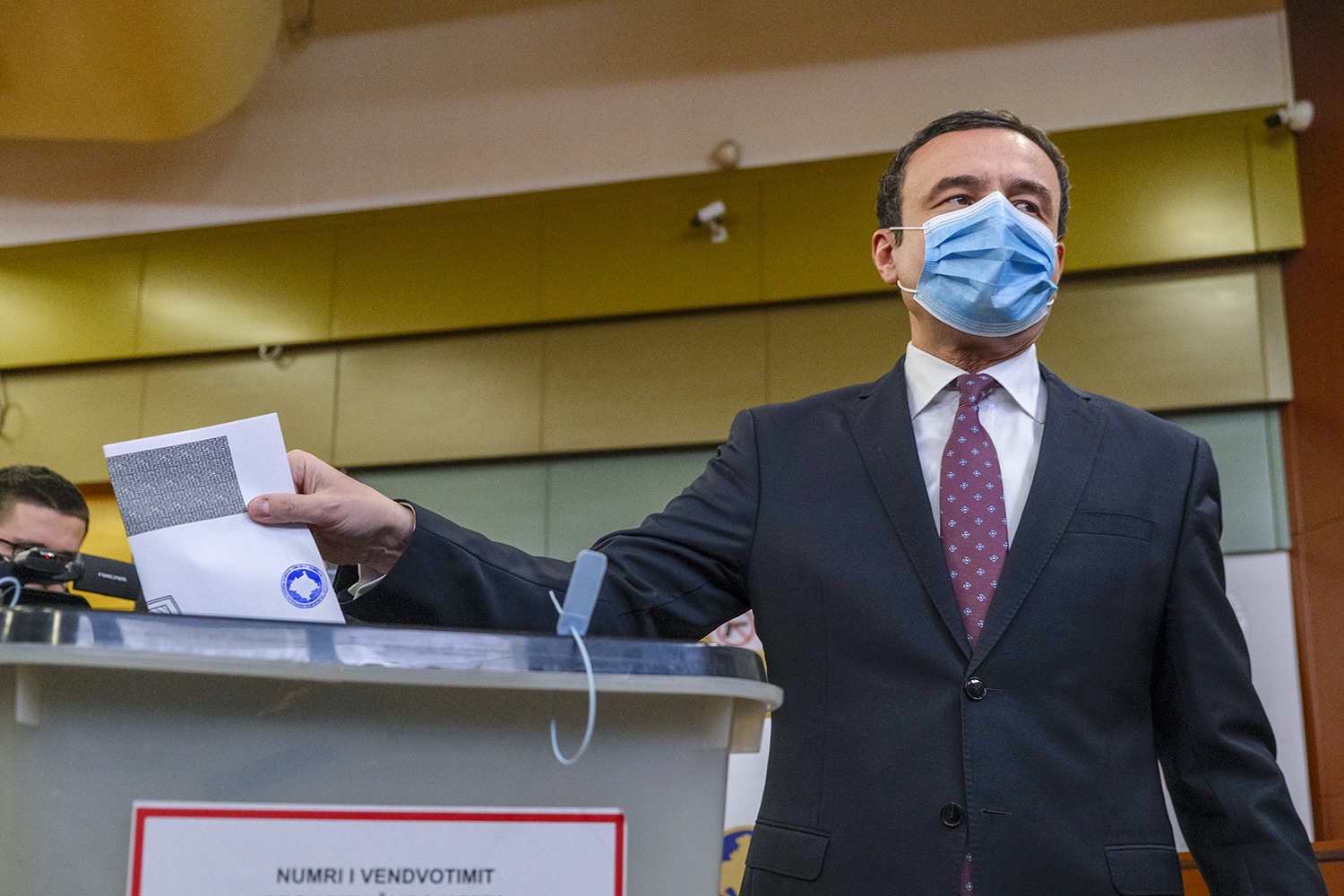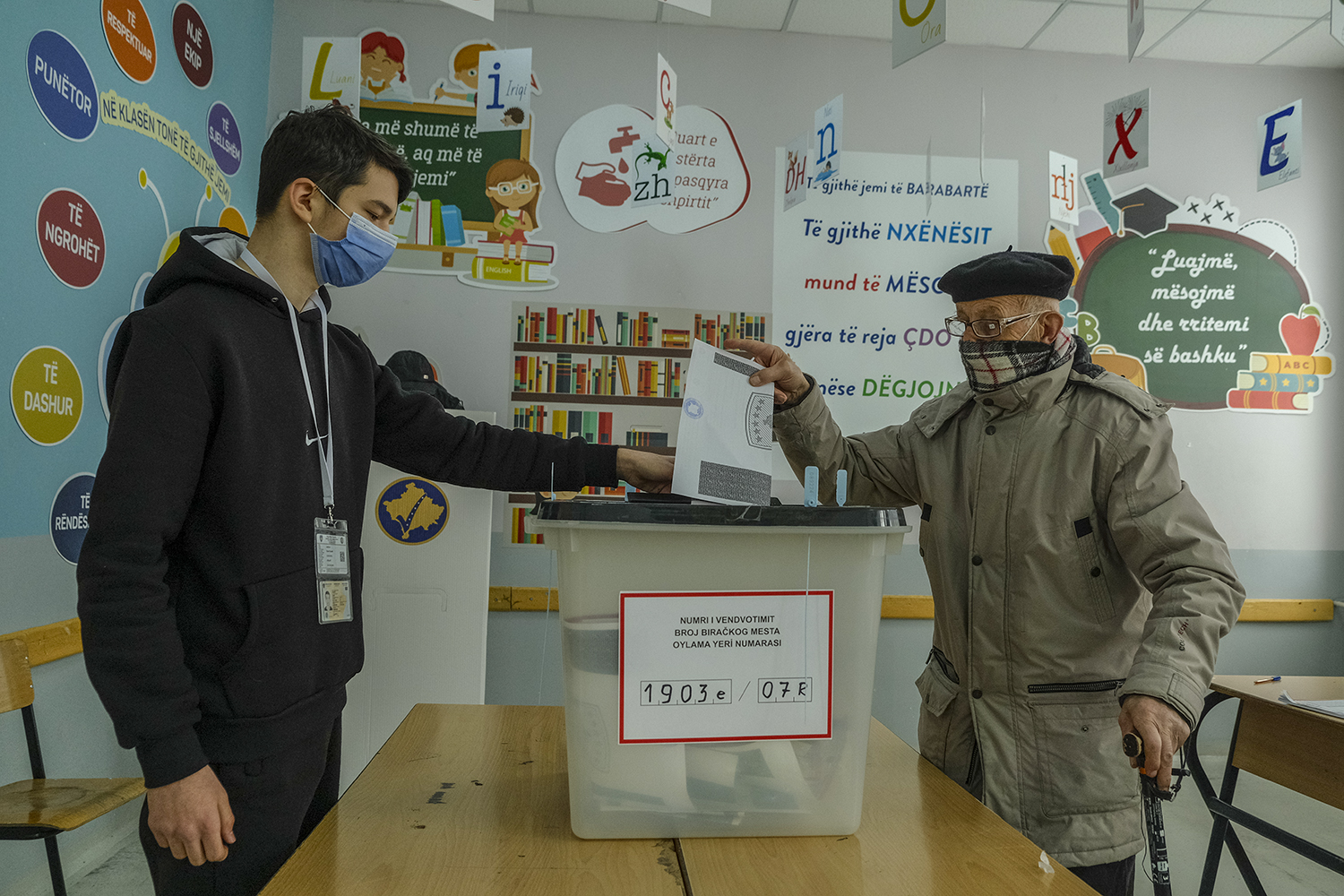Vetëvendosje (VV) is on course to complete a landslide victory in Sunday’s extraordinary general election.
With over 99% of regular votes counted, Albin Kurti’s party has secured almost 48% of the votes — more than any party in Kosovo’s post-war history.
In an election VV billed as a referendum on Kosovo’s future, citizens responded in huge numbers to hand the party a comprehensive victory. By the early hours of the morning, it had already achieved the record vote tally for any party in an election, surpassing the 359,851 votes received by Ibrahim Rugova’s LDK in 2001.
The other major parties quickly conceded defeat after seeing their own share of the vote fall away.
The Democratic League of Kosovo (LDK) particularly saw its vote share collapse; at just 13% this represents the worst result in the party’s history, while the preliminary results indicate that there is not a single municipality where LDK has won the largest vote share.
LDK was vocally criticized by many last year after bringing down its own newly formed coalition government with VV in the height of the pandemic.
On Monday, party leader Isa Mustafa — who has led the party since 2010 and been a member since the ’90s — announced his resignation.
The Democratic Party of Kosovo (PDK) is set to finish second but its current vote share of around 17% would also represent its worst ever result.
With Nisma on course to miss the minimum 5% threshold for representation, the only other Albanian party likely to be represented in the Assembly is the Alliance for the Future of Kosovo (AAK), although its vote share of around 7% is also down on previous elections.
Belgrade-backed Srpska Lista has once again dominated the vote amongst Serb entities, while a new citizens’ initiative, Romani Iniciyativa, has secured more support than the other Roma entities combined.
VV is expected to see its lead increase further in the coming days after the counting of postal ballots sent by members of the diaspora.

After casting his vote, VV’s Albin Kurti told journalists that “citizens need democracy and institutions need legitimacy.” Photo: Atdhe Mulla / K2.0.
Postal ballots are counted separately from the in-person votes and diaspora representatives have warned that this process may take around 10 days due to record diaspora voter registration this year; according to Germin, the Central Election Commission (CEC) received 43,447 envelopes by post by the February 12 deadline, while each envelope may contain multiple ballots.
VV leader Albin Kurti has previously stated that he wants to win an overall majority of deputies in the Assembly and that he does not want to govern in coalition; acting President Vjosa Osmani — who teamed up with VV in a joint list after leading LDK’s ticket in 2019 — will also be watching the seat allocation carefully as she bids to receive the mandate from deputies for a full presidential term.
The final allocation of Assembly seats will be made after all votes have been counted and verified by the CEC, following any appeals and legal challenges. In previous years, this process has taken a number of weeks.

Many older citizens and those with disabilities had to battle inadequate infrastructure in addition to icy temperatures on their way to vote. Photo: Atdhe Mulla / K2.0.
At 47%, turnout in this election was also higher than in any election since 2004 as citizens braved snow, sub-zero temperatures and COVID-19 restrictions to cast their votes.
Turnout increased significantly in Kosovo’s four majority-Serb northern municipalities — and in three municipalities is more than 80%. There have been some media reports of electoral irregularities in these areas, but these have not been independently verified by election monitors.
‘By no means a mandate for revenge’
Shortly after various media published the first projected results after the closing of polling stations at 7 p.m., fireworks erupted in Prishtina and VV supporters began to gather to celebrate in a number of city centers around the country.
As the results started to pour in and the direction of travel became clear, the capital’s streets reverberated with the sound of car horns and VV chants as people drove laps of the city vocalizing their support.
Just before midnight, Kurti and Osmani held an outdoor press conference, where both read victory speeches in front of dozens of activists and journalists and invited people to celebrate in their homes.
“We are aware of the great burden we carry as a result of the great trust you have given us, but your trust will also guide us on this journey,” Osmani said. “The responsibility you have placed in us is also a great honor because together we are continuing the work of developing the democracy that we worked so hard to build.”
After often finding herself the target of personal abuse from political opponents — particularly those within her own former party — Osmani presented a conciliatory tone.
“This is by no means a mandate for revenge, nor is it a mandate to [look] backward,” she said. “This is the chapter of work that will be done; it is a mandate when we honor our common history, when we guarantee prosperity, fight corruption persistently and uncompromisingly, ensure justice and work diligently for equality.”


